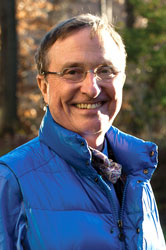Conservationist Thomas Lovejoy to Discuss Climate Change at MBL Falmouth Forum, October 1

WOODS HOLE, MA—Internationally renowned conservation biologist Thomas Lovejoy will explain how biological systems can contribute toward reducing climate change at the next MBL Falmouth Forum on Thursday, October 1 at 7:30 PM in the MBL’s Lillie Auditorium, 7 MBL Street, Woods Hole. The talk, titled “A Wild Approach to Climate Change,” is co-sponsored by The 300 Committee of Falmouth and the MBL Associates. The Falmouth Forum series is supported in part by the Falmouth Forum Endowment. The event is free and open to the public.
Lovejoy is generally credited with having brought the tropical forest problem to the fore as a public issue, and is one of the main protagonists for the science and conservation of biological diversity. He was the first person to use the term biological diversity in 1980 and made the first projection of global extinction rates in the Global 2000 Report to the President that same year.
Spanning the political spectrum, Lovejoy has served on science and environmental councils under the Reagan, Bush, and Clinton administrations. At the core of these many influential positions are Lovejoy’s seminal ideas, which have formed and strengthened the field of conservation biology.
In the field of international conservation, Lovejoy is the originator of the innovative concept of debt-for-nature swaps. Many such swaps of international debt for conservation projects have been initiated in countries that include Bolivia, Costa Rica, Ecuador, the Philippines, Madagascar, Jamaica, and Zambia. Over a billion dollars in conservation funds have already been made available with this mechanism.
With two co-edited books, Lovejoy is credited with founding the field of climate change biology. He and Lee Hannah are working on the second edition of Climate Change and Biodiversity. Lovejoy is the founder of the public television series Nature, and for many years he served as principal advisor to the series. The program is the most popular long-term series on public television.
In 2010 Lovejoy was elected University Professor in the Department of Environmental Science and Policy at George Mason University. He served as President of the Heinz Center for Science, Economics, and the Environment from 2002 to 2008 and was the Biodiversity Chair of the Center from 2008 to 2013. Before assuming this position, Lovejoy was the World Bank’s Chief Biodiversity Advisor and Lead Specialist for Environment for Latin America and the Caribbean as well as Senior Advisor to the President of the United Nations Foundation. In 2001, Lovejoy was awarded the prestigious Tyler Prize for Environmental Achievement. In 2009 he was the winner of BBVA Foundation Frontiers of Knowledge Award in the Ecology and Conservation Biology Category. In 2009 he was appointed Conservation Fellow by the National Geographic. In 2012 he was recognized by the Blue Planet Prize. Lovejoy holds B.S. and Ph.D. (biology) degrees from Yale University.
An optional buffet dinner will precede the lecture at 6:00 PM at the MBL’s Swope Center, 5 North Street, Woods Hole. Tickets are $30 (meal includes salad, pasta or potatoes, two entrees, wine, dessert, tax and gratuity) and must be purchased in advance at Eight Cousins Bookstore, Main Street, Falmouth or at the MBL Communications Office, 127 Water Street, Woods Hole. Dinner tickets are available until they sell out or until 5:00 PM on Monday, September 28. For more information, contact the MBL Communications Office at (508) 289-7423 or comm@mbl.edu. There will also be a free reception with Lovejoy following his talk in the Meigs Room at the MBL’s Swope Center.
The remaining presentations in the 2015-2016 MBL Falmouth Forum series are below. Visit mbl.edu/falmouth-forum for details and updated information.
November 6, 2015
Symphony Confidential: A Revolutionary Approach to Classical Music
Jung-Ho Pak, Cape Symphony artistic director and conductor
HERMAN T. EPSTEIN ENDOWED MEMORIAL LECTURESHIP
December 4, 2015
Brave Genius: Jacques Monod’s Adventure from the French Resistance to the Nobel Prize
Sean B. Carroll, award-winning scientist, writer and educator
March 4, 2016
How to Build a Heart: Lessons from Man and Nature
Duke Cameron, professor and chief of cardiac surgery, The Johns Hopkins Hospital
April 1, 2016
This Verse Business: One-man Show about Poet Robert Frost
Gordon Clapp, Emmy-winning actor
Date TBD
Life Lessons from Living in Space
Sunita Williams, Captain, US Navy
—###—
The Marine Biological Laboratory (MBL) is dedicated to scientific discovery and improving the human condition through research and education in biology, biomedicine, and environmental science. Founded in Woods Hole, Massachusetts, in 1888, the MBL is a private, nonprofit institution and an affiliate of the University of Chicago.
The MBL Associates are a group of individuals and businesses that support the scientific mission of the MBL through their gifts to the Annual Fund. The Associates sponsor educational and research programs for the MBL and raise funds for special projects. In addition, they operate the MBL Gift Shop, located on Water Street in Woods Hole, the profits from which support scientific fellowships.
